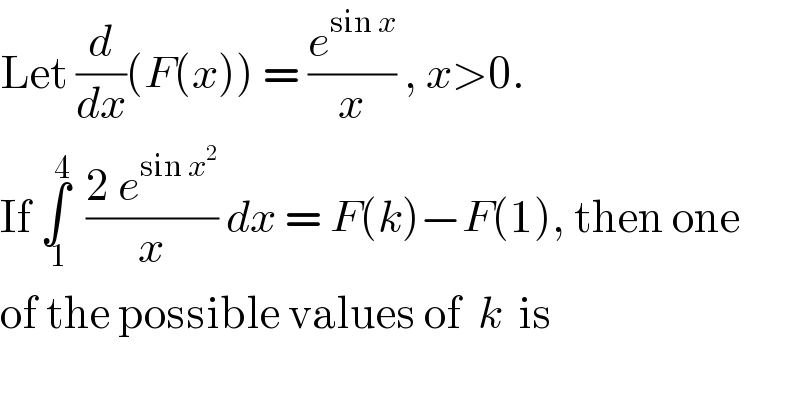
Question Number 65961 by mmkkmm000m last updated on 06/Aug/19

$$\mathrm{Let}\:\frac{{d}}{{dx}}\left({F}\left({x}\right)\right)\:=\:\frac{{e}^{\mathrm{sin}\:{x}} }{{x}}\:,\:{x}>\mathrm{0}. \\ $$ $$\mathrm{If}\:\underset{\:\mathrm{1}} {\overset{\mathrm{4}} {\int}}\:\:\frac{\mathrm{2}\:{e}^{\mathrm{sin}\:{x}^{\mathrm{2}} } }{{x}}\:{dx}\:=\:{F}\left({k}\right)−{F}\left(\mathrm{1}\right),\:\mathrm{then}\:\mathrm{one} \\ $$ $$\mathrm{of}\:\mathrm{the}\:\mathrm{possible}\:\mathrm{values}\:\mathrm{of}\:\:{k}\:\:\mathrm{is} \\ $$
Answered by mr W last updated on 06/Aug/19
![∫_( 1) ^4 ((2 e^(sin x^2 ) )/x) dx =∫_( 1) ^4 ((2x e^(sin x^2 ) )/x^2 ) dx =∫_( 1) ^4 (e^(sin x^2 ) /x^2 ) d(x^2 ) =∫_( 1) ^(16) (e^(sin t) /t) dt with t=x^2 =[F(t)]_1 ^(16) =F(16)−F(1) =F(k)−F(1) ⇒k=16](Q65962.png)
$$\underset{\:\mathrm{1}} {\overset{\mathrm{4}} {\int}}\:\:\frac{\mathrm{2}\:{e}^{\mathrm{sin}\:{x}^{\mathrm{2}} } }{{x}}\:{dx} \\ $$ $$=\underset{\:\mathrm{1}} {\overset{\mathrm{4}} {\int}}\:\:\frac{\mathrm{2}{x}\:{e}^{\mathrm{sin}\:{x}^{\mathrm{2}} } }{{x}^{\mathrm{2}} }\:{dx} \\ $$ $$=\underset{\:\mathrm{1}} {\overset{\mathrm{4}} {\int}}\:\frac{{e}^{\mathrm{sin}\:{x}^{\mathrm{2}} } }{{x}^{\mathrm{2}} }\:{d}\left({x}^{\mathrm{2}} \right) \\ $$ $$=\underset{\:\mathrm{1}} {\overset{\mathrm{16}} {\int}}\:\frac{{e}^{\mathrm{sin}\:{t}} }{{t}}\:{dt}\:\:{with}\:{t}={x}^{\mathrm{2}} \\ $$ $$=\left[{F}\left({t}\right)\right]_{\mathrm{1}} ^{\mathrm{16}} \\ $$ $$={F}\left(\mathrm{16}\right)−{F}\left(\mathrm{1}\right) \\ $$ $$={F}\left({k}\right)−{F}\left(\mathrm{1}\right) \\ $$ $$\Rightarrow{k}=\mathrm{16} \\ $$
